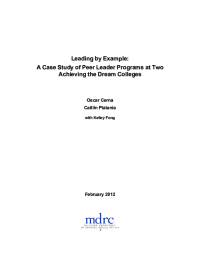Leading by Example
A Case Study of Peer Leader Programs at Two Achieving the Dream Colleges
This report draws on the experiences of two Massachusetts community colleges that employed academically successful students to serve as peer leaders. The Achieving the Dream initiative supports colleges’ investments in the resources and personnel needed to make desired institution-wide changes. As part of the initiative, Northern Essex Community College has used Supplemental Instruction Leaders, and Bunker Hill Community College has used Peer Mentors in order to strengthen student success and promote institutional improvement efforts.
Both colleges chose to implement peer leader programs in developmental (remedial) and gatekeeper (introductory college-level) courses that have historically been difficult for many students to pass. This report describes recruitment, training, activities, and costs related to developing these peer leader programs as well as how peer leaders worked with students and faculty inside the classroom. Students, peer leaders, faculty, and administrators offered perspectives in focus groups and interviews during the 2010-2011 academic year. Key findings include the following:
- Peer leaders at both colleges offered additional academic assistance to students by introducing and reinforcing lessons covered in class and by helping their faculty partners facilitate classroom activities.
- Program staff and faculty members recruited and selected peer leaders with strong academic and interpersonal skills. However, specific peer leader tasks and functions inside and outside the classroom varied based on how assigned faculty members agreed to have peer leaders work with students.
- Students in peer-assisted courses generally felt that they benefited from receiving peer leaders’ guidance and support, and they appreciated that this guidance and support was provided by fellow students.
- Both colleges have expanded their peer leader programs across sections and disciplines, prompting them to establish more program standards and articulate more practices. College administrators generally considered the programs affordable and cost-effective.
The development of peer leader programs at Northern Essex and Bunker Hill reveals innovative ways in which colleges can enhance student learning and engagement in community college classrooms. Over the past years, both colleges have carefully implemented and expanded peer leader programs for students in need of extra support. Peer leaders provide a unique perspective for students and have the ability to create a learning environment unlike that of the typical instructor-student relationship. Community colleges interested in creating or expanding their own peer leader programs may find lessons in the theoretical, operational, and fiscal challenges and considerations that marked the implementation of the two programs discussed in this report.







